Let's acknowledge right from the outset that 2020 was a horrible year in very many ways.
The arrival of a terrifying new plague changed our lives forever, causing tragic loss of life around the world – the World Health Organization's Hans Kluge announced that the 313,000 excess deaths across 27 European countries in 2020 was a five-fold increase on 2019 – not to mention having effects as yet unknown on long-term health and economic recovery.
But hidden behind the doom-filled headlines there are many ways the world became a better place in 2020. Here is a selection:
Cleaner air
While attention to matters ecological may have wavered slightly during 2020, unquestionably humankind has to reduce its carbon footprint. So there's good news that CO2 emissions fell by a record amount in 2020.
The suspension of industry and the lockdown of society contributed to a global 7 percent fall year-on-year in fossil CO2 emissions, according to researchers at Future Earth's Global Carbon Project, from 36.44 billion tons to 34 billion.
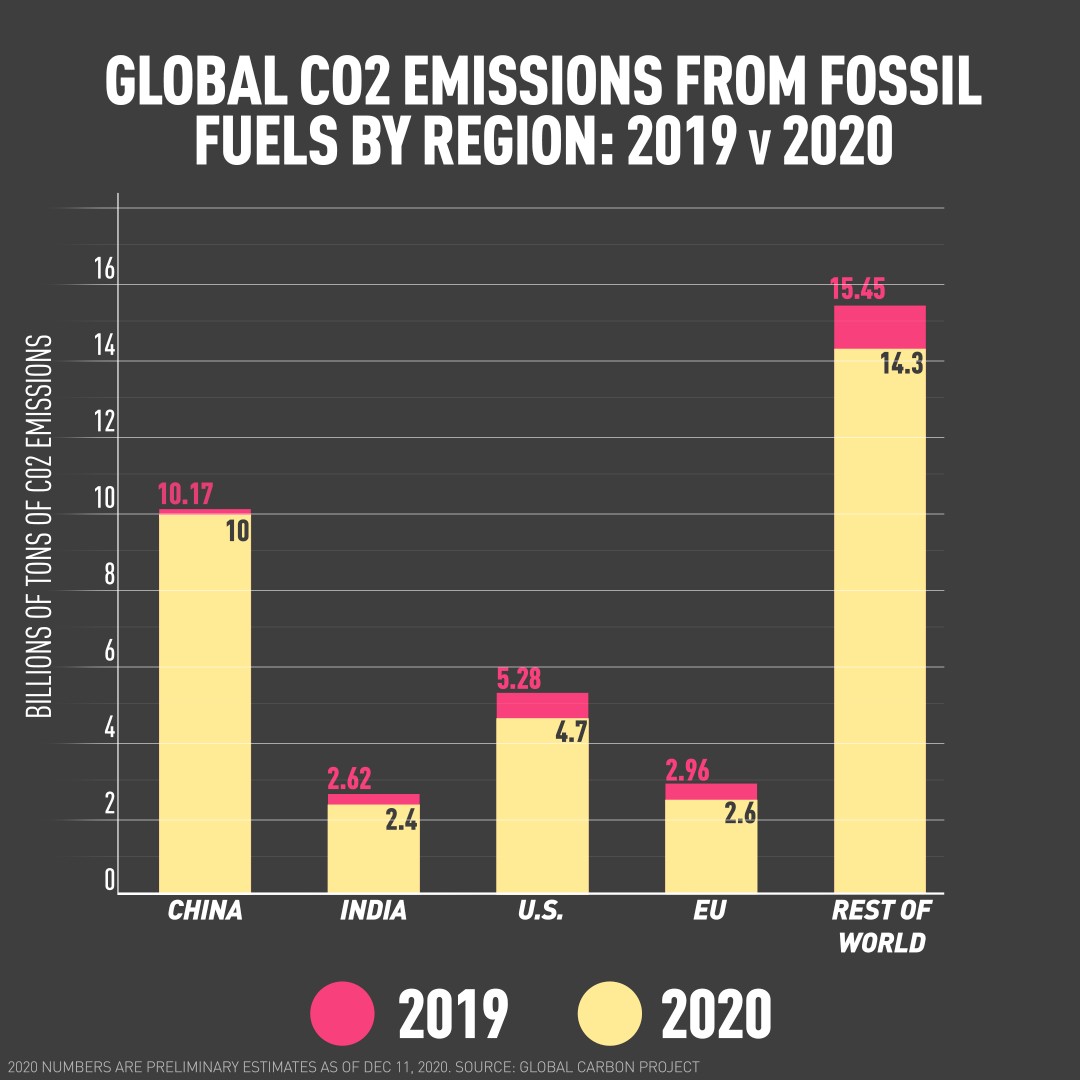
Glen Peters, research director at Norway's Centre for International Climate Research (CICERO), told a press briefing: "You'd have to go back to 1945 – World War II – to see a relative drop bigger than this 7 percent."
And it wasn't just carbon dioxide that fell this year. In November, NASA researchers – busily crunching numbers ahead of the unmissable 2020 International Conference for High Performance Computing, Networking, Storage, and Analysis – found that global nitrogen dioxide concentrations dropped by nearly 20 percent since February.
Fossil fuels becoming a relic
Clearly, the long lockdowns made 2020 a special case – or at least, we all fervently hope so. But there were other clear signs that humankind's reliance on ecologically unsound fossil fuels is waning fast – and not just from eternally optimistic eco-warriors.
In September, oil giant BP released a report saying the pandemic had pushed the world past "peak oil" –estimating that demand will fall by 10 percent this decade and as much as 50 percent over the next two decades.
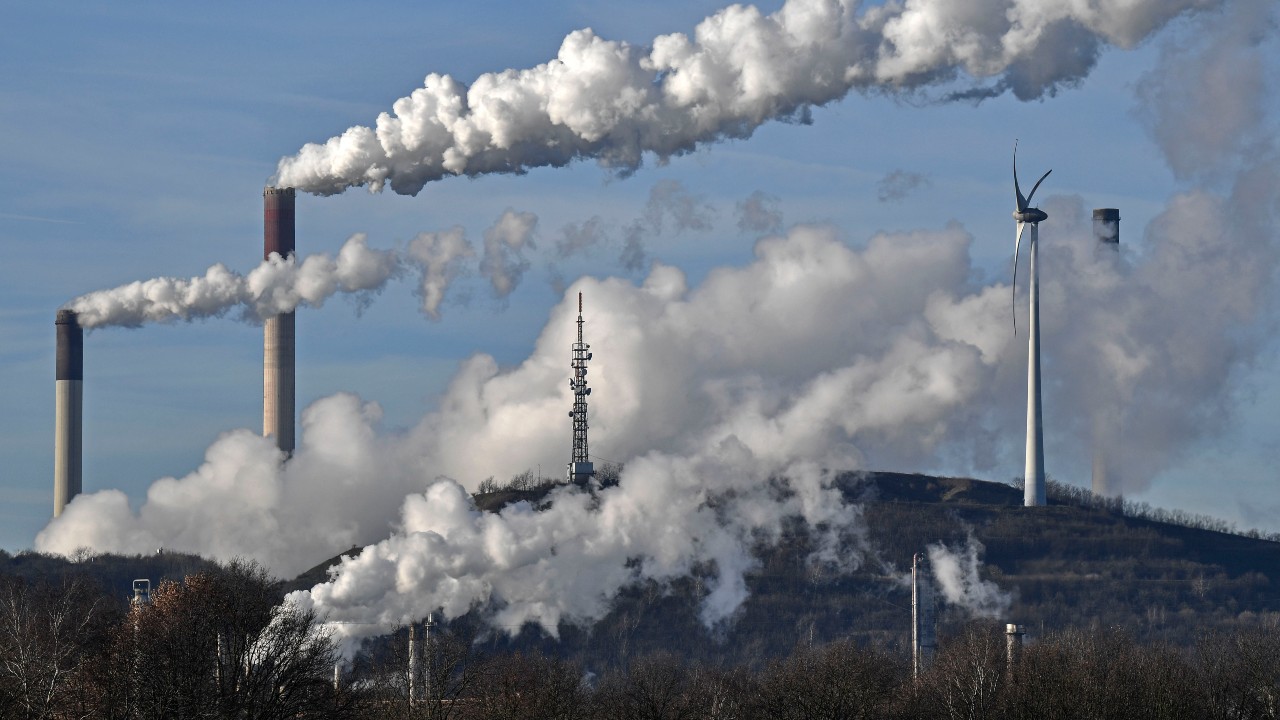
A coal-fired power plant and a refinery steam beside a wind generator in Gelsenkirchen, Germany. /Martin Meissner/AP
BP also predicted demand for coal would drop 20 percent by 2050; considering it's only three years since BP's annual reports first acknowledged the possibility of peak coal, it's no wonder the company is now rapidly pivoting from being a resource-based oil business to a solutions-providing "integrated energy company."
This wasn't overly dramatic futurology. In the first three months of 2020, helped by a surge in the capacity and production of wind power, renewable energy made up almost half of the UK's electricity generation.
In April, Britain broke a personal best by managing without coal-fired electricity generation for the longest stretch since the Industrial Revolution that began in the late 18th century. It also set a new solar power record, with more than 9.6GW of electricity generated on April 20.
Green is the color for cars
The shift to greener energy was also reflected in that former bastion of fossil fuels, the car. Globally, electric vehicle sales grew 28 percent in 2020 – with Europe leading the way, thanks in part to new models striving to meet new EU emissions rules.
By December, green policy group Transport Environment was happily projecting that one in 10 new cars sold across Europe during 2020 would be electric or plug-in hybrid, tripling 2019 levels. This share was predicted to grow to 15 percent during 2021.
"Electric car sales are booming thanks to EU emissions standards," said Transport Environment's clean vehicle director Julia Poliscanova. "Next year, one in every seven cars sold in Europe will be a plug-in."
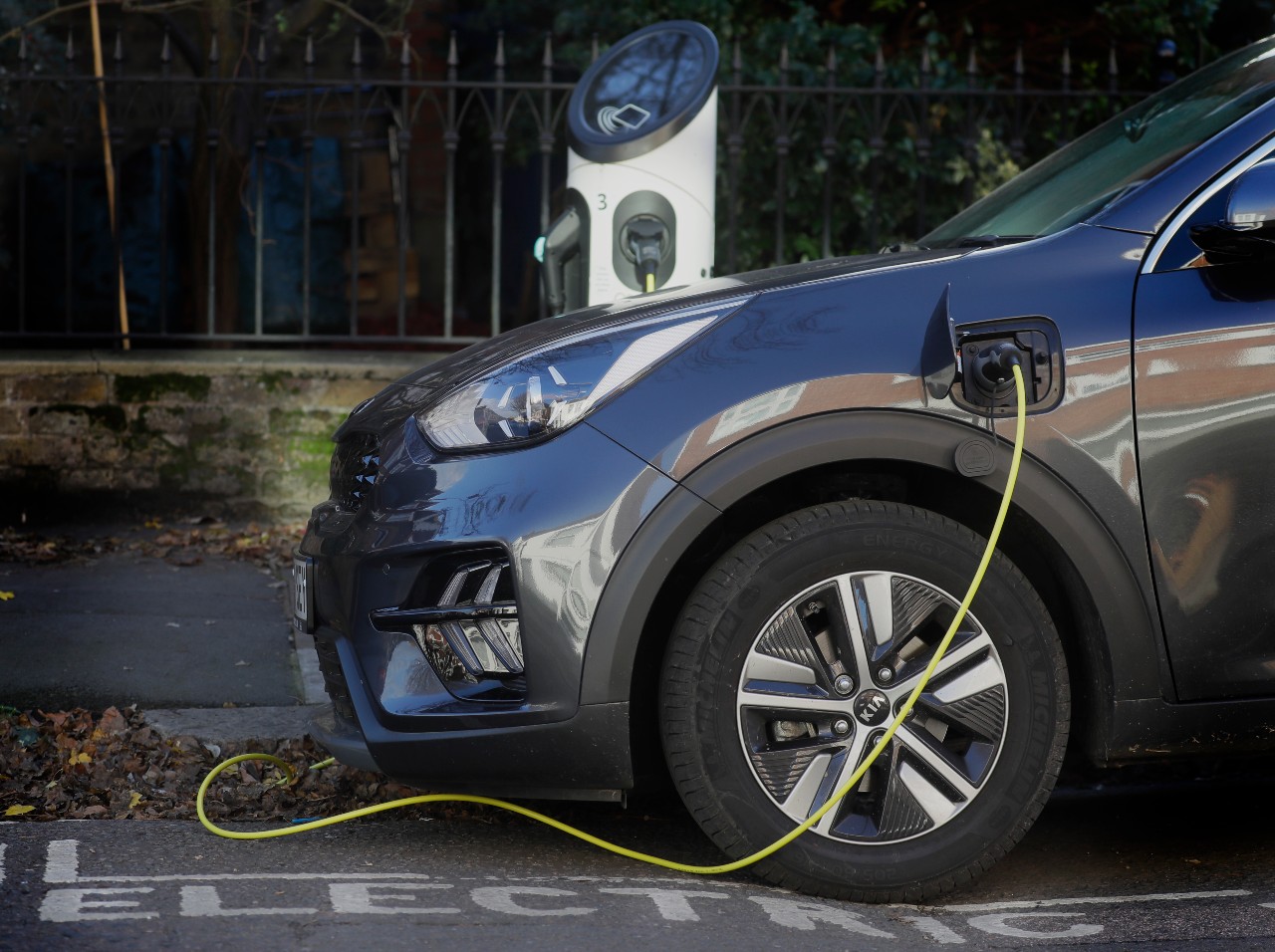
Waning fossil fuels and improving technology have pushed electric cars past the tipping point and into the mass market. /Kirsty Wigglesworth/AP
Some countries are already ahead of that curve. In early January 2021, the Norwegian Road Federation announced that 54.3 percent of the country's new car sales in 2020 were electric models, shooting up from 42.4 percent in 2019.
Norway, which gives electric cars tax exemptions, thus became the first country in which electric car sales overtook petrol, diesel and hybrid models –and it's unlikely to lift its foot from the pedal as it seeks to become the first nation to end the sale of petrol and diesel cars by 2025.
Such determination is also catching on. During 2020, California became the first U.S. state to announce a forthcoming ban on the sale of internal combustion engines, setting 2035 as the target date.
Safer roads
The pandemic brought curious fluctuations in traffic patterns: While cycling and walking boomed (when we were allowed out), working from home meant car journeys plummeted – and therefore, in many cases, so did road traffic accidents (RTAs).
Indeed, in Spain the pandemic prompted the number of RTA fatalities to fall to its lowest since records started in 1960, according to interior ministry data.

Fatal RTAs dropped from 1,010 to 790 and deaths from 1,101 to 870, both 21 percent reductions, while the number of people requiring hospital treatment after RTAs fell 22 percent, from 4,433 to 3,463.
Still, Spain seeks safer roadways. While announcing the results, Interior Minister Fernando Grande-Marlaska unveiled new rules under which bicycle couriers must wear helmets at all times, because they "move permanently on the roads of our cities and their personal safety must be guaranteed."
And speaking of bicycles...
Capital cycling boom
It's fair to say 2020 wasn't entirely brilliant for Boris Johnson: His first full year as UK prime minister was marked by exhausting Brexit negotiations and the COVID-19 pandemic, which almost cost him his life.
It was, however, a great year for "Boris bikes" – the hire cycles brought in by Transport for London (TfL) during Johnson's time as city mayor. With less traffic on the road (and more commuters wishing to avoid buses and Tube trains), the number of new registrations for the scheme jumped by 167 percent, the biggest in its 10-year history.
In addition, total hire numbers rose to 10,434,167 – up from 2019's total of 10,168,936, despite a significant overall reduction in journeys across London. As TfL's head of cycle hire business development Helen Sharp proudly noted, it has contributed to "the largest increase in cycling in London since records began."
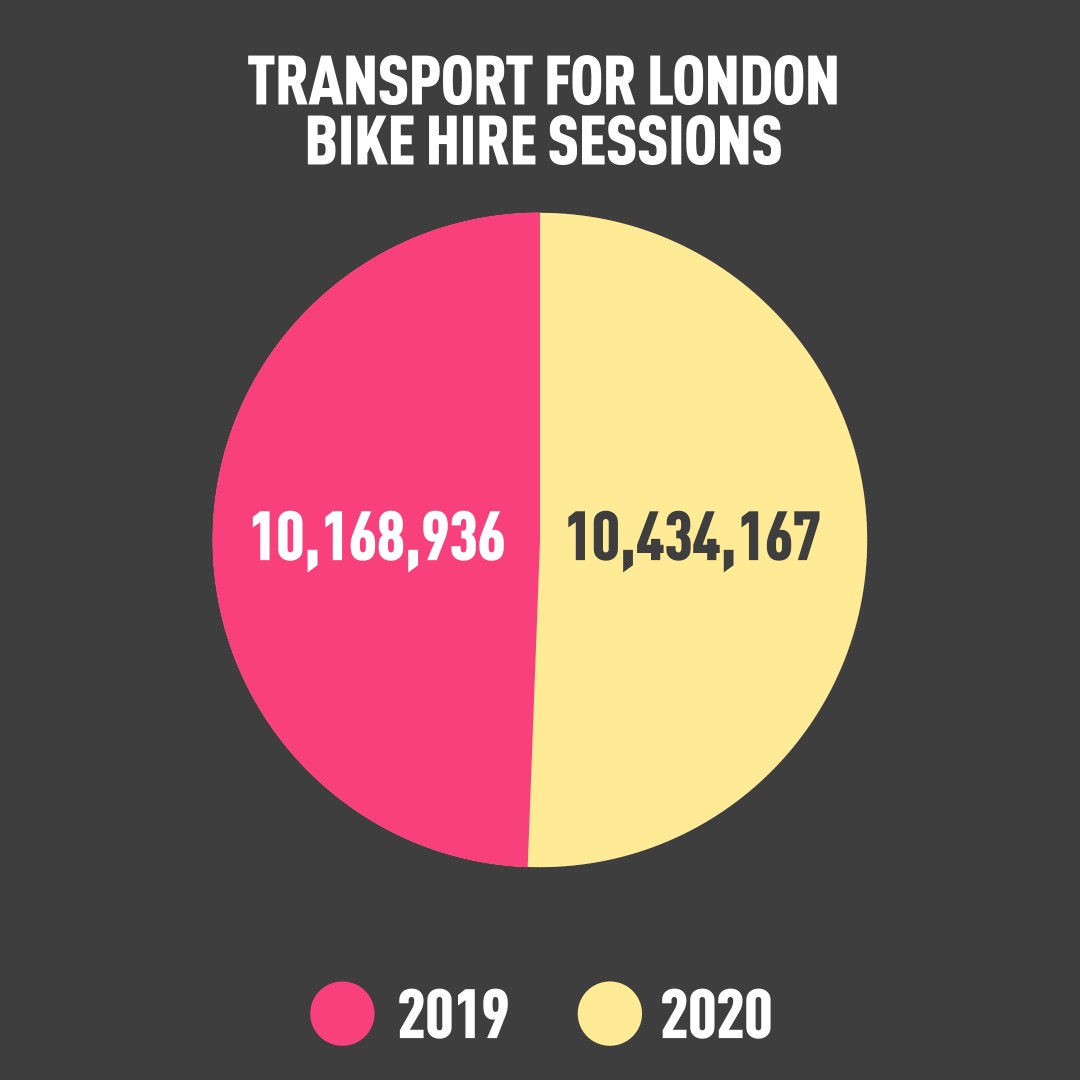
Getting back on the bike
Clambering into the saddle wasn't restricted to London. Data released in December by activity-tracking app Strava showed its 72 million users uploaded more than 1.1 billion outings, with almost double 2019's totals of runs and bike rides and triple the number of walks.
Interestingly, it seems much of these increases came from women, with a global 45 percent posting a rise from the 18-29 age group and 25 percent from other female cohorts. Male posts grew by a comparatively weedy, though still commendable, 10 percent.
The app's 9 million UK users seemed to particularly take to it, with women aged 18-29 recording a 108 percent rise in activities and other female age groups boosted by between 52 and 65 percent. Strava's presumably delighted director of international marketing Simon Klima said such an increase "was nothing like we've seen before and far surpassed our projections based on historical trends."
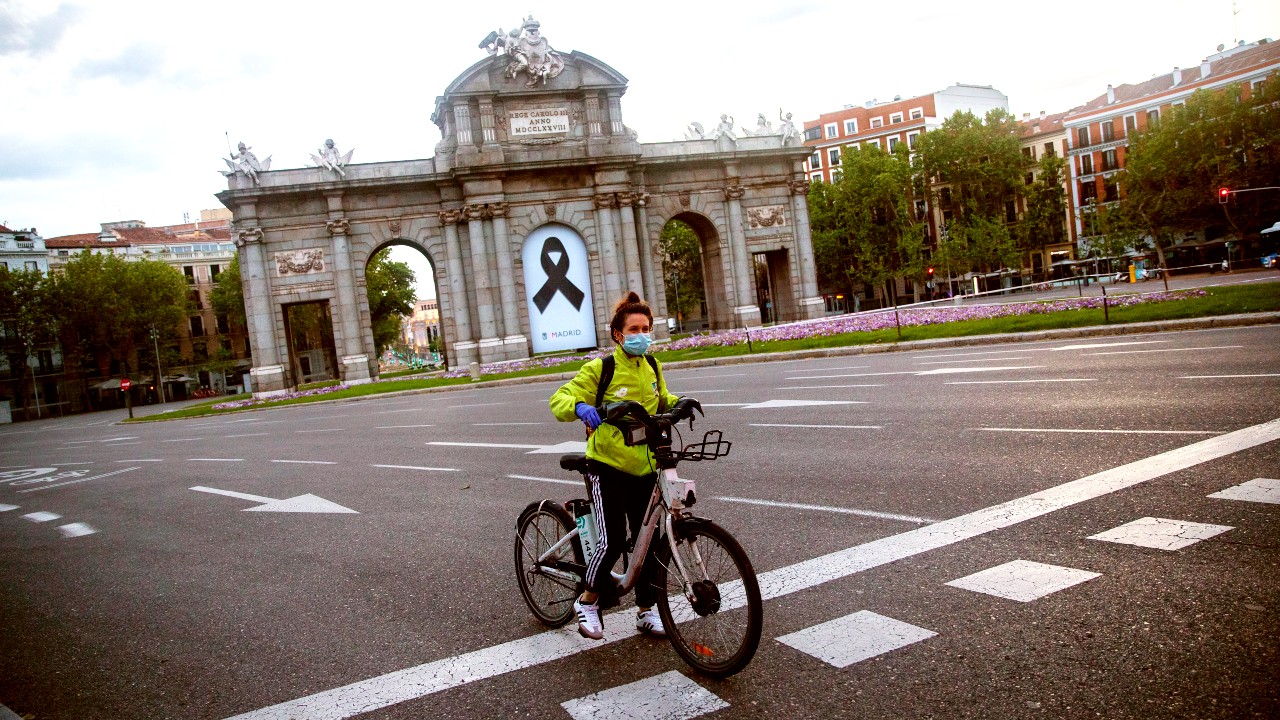
A woman rides Madrid's electric bike hire service BiciMAD in front of Puerta de Alcala square featuring a black ribbon for the victims of COVID-19. /Manu Fernandez/AP
Pressed for reasons, Klima noted that previous research suggested "one of the biggest blocks for women to cycling is a perceived safety risk," another nod to reduced vehicular traffic boosting bike usage.
Klima also suggested running had increased "perhaps partly as an alternative to gym classes," before identifying a truism of the unexpected contemporary industrial revolution: "Working from home gives some people freedom to be active during the day as they spend less time commuting to an office. It has allowed people to take control of their calendars a little bit more and to find more time for being active."

Not every lockdown cycle ride was for fitness or fun: here, a food delivery worker cycles along empty roads past the Colosseum in Rome. /Cecilia Fabiano/LaPresse via AP
Stubbing out smoking
Besides picking up extra exercise, it seems many have been kicking bad habits. As early as July, two UK surveys suggested a rapid rise in the number of people giving up smoking –partly thanks to the pandemic.
Extrapolating from a representative sample of 10,000 people surveyed between April and June about their smoking habits, polling organization YouGov estimated that more than a million Britons had stopped smoking during the pandemic.
Among that sizeable slice of those surveyed, 41 percent cited their decision to quit as a direct response to COVID-19. Health concerns, limited access and a drop in social smoking were suspected factors.
A separate survey, part of a long-term study by University College London, discovered that more smokers quit in the year to June 2020 than in any year since the research began in 2007. Researchers had polled 1,000 people per month in England and found 7.6 percent quit in the year to June 2020 –almost a third above the survey's lifetime average.
(CGTN)
 简体中文
简体中文









